Disclosure: Meeple Mountain received a free copy of this product in exchange for an honest, unbiased review. This review is not intended to be an endorsement.
How often in your life do you get to be the first person, that isn’t the designer, to play a brand new game? I had that experience with Devil’s Choice, a currently unpublished game from first time designer Jim Hasty. Read on for the background, or jump straight to my review.
Last Thanksgiving I got an unexpected email from a gentleman named Jim Hasty:
Dear Andy,
I was surfing the internet in search of information for game developers and found your website. It was a delightful discovery. Your dad and I have been friends since eighth grade and used to play basketball, football, golf, board games, card games and just about every action game we could find. I can remember vividly the days we tried to outwit each other playing photo-electric football in your grandparent’s attic and playing Le Mans, an Avalon Hill racing game, in a friend’s basement. We still get together every February to play golf for a few days with a group of family and friends. He told me about you, but never mentioned the website. I could hardly believe it when I found it and saw the wonderful photo of you and your family. I know first-hand where your passion for fun and games comes from.
It looks like you have a full plate and I don’t want to take up much of your time. I’m writing to get some advice about a card game named Devil’s Choice I made this year during the Covid shutdown.
A lead-in like that grabbed my attention so I replied back, asking for a copy. I played it with family and friends, and even my Dad, and I’ve been pleasantly surprised by how good it is.
Devil’s Choice Overview
Devil’s Choice is a card-shedding game in which players attempt to empty their hand by playing cards in ascending order to one or more public queues in the middle of the table. The goal of Devil’s Choice is to have the lowest score after one player reaches 100 points.
The deck consists of blue and red cards numbering 1-10, a handful of Devil cards that provide special abilities to players, a few Wild cards, and 4 “Q” (queue) cards.
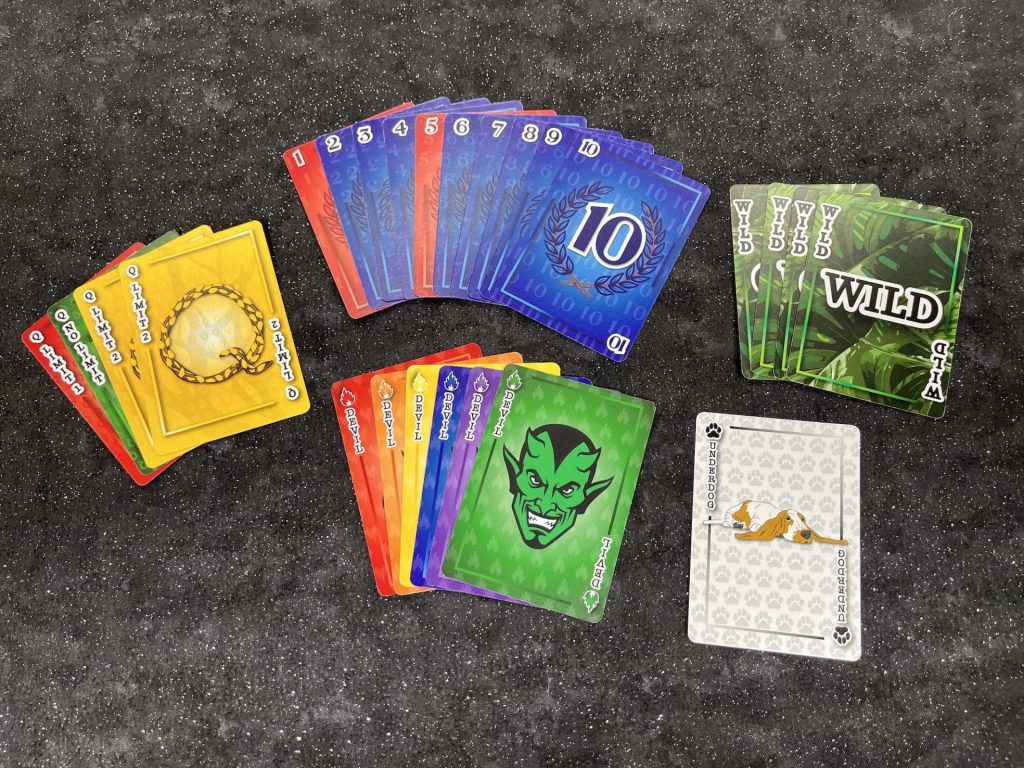
Players each receive a single Devil card, and a hand of number cards based on player count (10 cards in a 2-4 player game, 8 in a 5 player game). A single “Limit 2” Q card is placed in the middle of the table, this being the starting play area. The remaining number cards are placed face down in a draw deck, with a single card flipped over to seed the discard pile. Any remaining Devil and Q cards are shuffled together with the Wild cards and set them aside into a facedown draw pile known as The Blind. Players will be allowed to draw from this face down pile throughout the game (more on that later). Finally the player with the fewest red number cards will receive the Underdog card (more on this later as well).
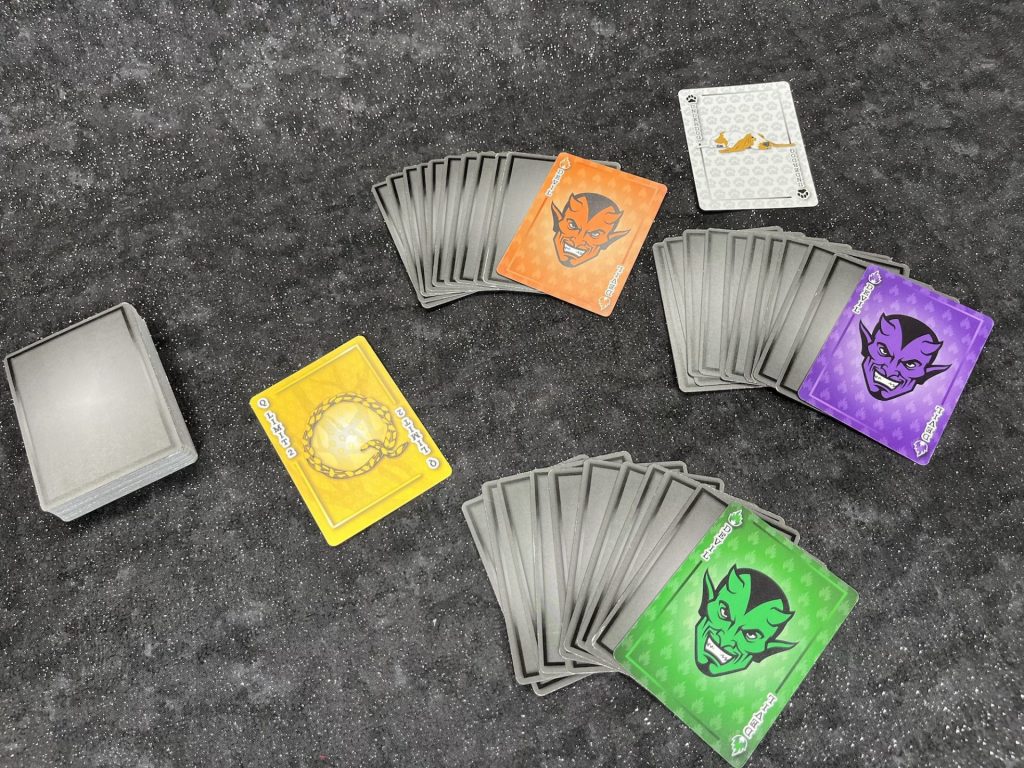
The Anatomy of a Turn
On your turn you’ll play at least 1 card to the table, but potentially more based on which Q cards have been revealed. Each Q card has specific instructions about how many cards can be played against it: Red Q cards allow only 1 card, Yellow Q cards allow players to lay down 2 cards, while the Green Q card has no limit. Cards you play must be in ascending order, and must start with the topmost card in each Q card pile.
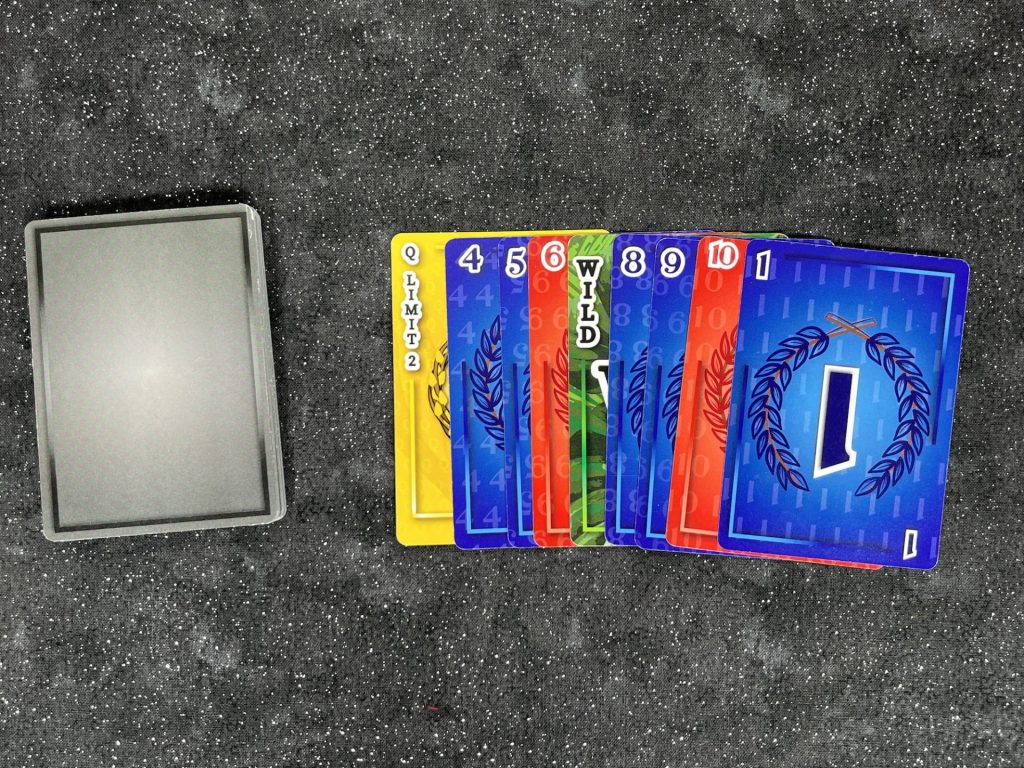
If you play one of the less common red numbered cards, you’ll get to select from The Blind. The cards you might draw from The Blind are as follows:
- Devil cards – allow a player to block a Q (preventing others from playing onto the indicated Q). They can also be used to steal a single card from any player’s face up hand.
- Wild cards – can be substituted into the play sequence on any Q card. Wild cards also allow players to remove the block from any Q.
- Q cards – behave as previously indicated. Q cards can either be added to your hand for future play, or can be played immediately, and then played upon by the active player.
If you can’t play a card then you have to draw from the center deck. But first you must place your entire hand face up in front of you, allowing other players to steal from you to power their turn. This isn’t always bad because they’re also bringing you closer to completing the game as well. Once your hand has been laid onto the table, it can’t be picked up again.
As Q cards are revealed they can be played to the play area and immediately played upon by numbered cards, even by the active player. Every turn, each player may play as many cards to every Q as are labeled on the card.
When one player has placed all their cards the round ends and scores are recorded. Players receive 5 points for each numbered card (regardless of color), 10 points for each Devil or Wild card, and 20 points for a Q card. If the player holding The Underdog card goes out first, or has the lowest score at the end of the round, then all other players have their scores for the round doubled.
If no one has reached 100 points, shuffle and deal again.
Final Thoughts on Devil’s Choice
I really liked Devil’s Choice. I love light card games, they’re possibly my favorite genre of game because they let you focus more on time spent with the other players as opposed to time spent on “the game”. They’re also one of few broad categories of games that I can reliably play with my wife: Five Crowns, No Thanks, and PUSH are all great examples of this type of game. I’m happy to say that Devil’s Choice fits squarely into this category. It’s rules-light, each individual round plays in 5-10 minutes, and the game is easy to teach. More importantly you can spend most of your time talking with other players while turns go around the table.
But enough about broad definitions; what did I think about Devil’s Choice? I really liked it. There’s some real sophistication in the design of this game. Card shedding games are nothing new, but Jim Hasty manages to inject some fresh ideas into the mix. For example, the requirement that players must make their hand public when drawing from the deck. At first our players hated that idea because it means other players can take cards you might want on your turn. But then we realized that other players are taking cards from your hand, which contributes towards your goal. And because the only way you can steal from another player is to use a Devil card, there’s a maximum of 6 times stealing can happen per round.
But the Q cards are where the magic is at. They can propel the game forward, allowing players to either burn through their hands quickly, or throw an anchor onto gameplay and force players to scheme and pay closer attention to each other. And because you can put a Q card into your hand when drawn from The Blind you can save it for just the right moment when you’ve got a run of cards prime for laying down.
Just a note that this is a prototype version of the game. Jim had this printed up on his own with artwork he sourced from a friend of his. It’s a bit…colorful right now, which led to some confusing moments during our plays. I sent over a list of suggestions for future iterations of the game, including tweaking the color palette to keep like cards similarly colored (devil cards should all be the same color for example). But that doesn’t affect gameplay.
Devil’s Choice will be a delight to fans of other light card games like 6 Nimmt or Uno. Now someone needs to get this guy a contract already.


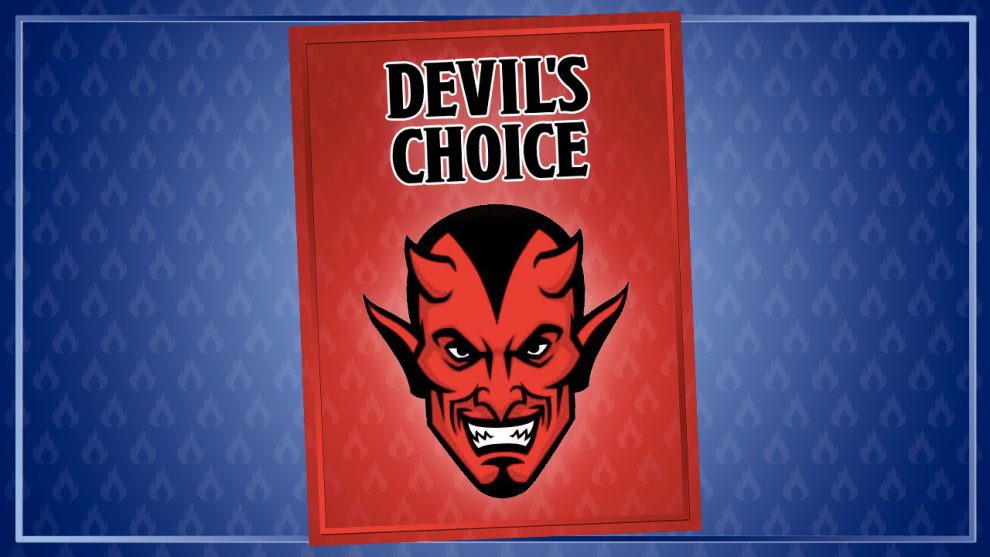

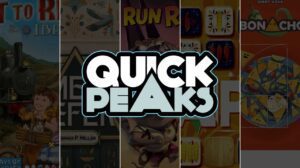
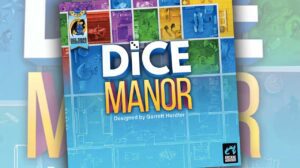





Add Comment